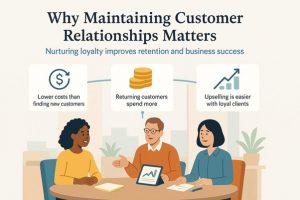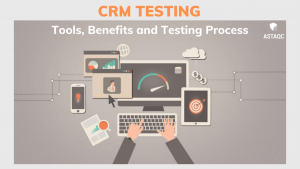

Think about the last time you interacted with a brand online. Maybe you filled out a form for a demo, maybe you bought something, or maybe you just signed up for their newsletter. Whatever the case, you expected the brand to remember who you are, what you want, and how best to serve you. That expectation is powered by one invisible engine- CRM (Customer Relationship Management) software. But here’s the catch—what happens when that engine fails?
We’ve all been there, and honestly, it doesn’t feel good. As customers, our trust in that brand drops instantly. As businesses, we know it can take years to build brand reputation but only seconds to lose it.
This is exactly where CRM testing steps in—not as a technical afterthought, but as a guardian of both brand reputation and customer trust. Today, let’s explore why CRM testing is so crucial, how it protects the image we’ve worked so hard to build, and why it’s not optional if we want to win customer loyalty.

Why Brand Reputation and Customer Trust Are Non-Negotiable
Before we get into testing, let’s pause for a moment. Brand reputation and customer trust are like the heartbeat of a business. Without them:
In this hyper-connected world, even the smallest slip-up can go viral. A customer who receives irrelevant offers or suffers from repeated errors might post about it on social media. One negative tweet can snowball into thousands of impressions—suddenly your brand looks careless, even if the mistake was a minor CRM glitch.
So, how do we prevent this? By making sure the CRM system—the foundation of customer interactions—is flawless. That’s where CRM testing takes center stage.
What Is CRM Testing Really About?
At its core, CRM testing is about validation and assurance. We’re not just testing software; we’re testing the very bridge that connects us with our customers. Here’s what it covers:
When we test these areas thoroughly, we’re not just avoiding bugs. We’re ensuring that every customer touchpoint reflects professionalism, reliability, and care.
How CRM Testing Protects Brand Reputation
Let’s break it down into real, tangible ways.
Imagine a loyal customer who has bought from us multiple times suddenly receiving a “Welcome to our brand!” email. Or worse, they’re addressed by the wrong name. Little details like these might seem minor, but they scream “We don’t know you.”
With proper CRM testing, we validate workflows, data fields, and personalization logic to make sure these hiccups never happen. The result is customers feel valued and recognized.
A CRM glitch that sends the same promotional email ten times in a row isn’t just annoying—it’s a public embarrassment. Customers might unsubscribe, complain, or even screenshot the blunder and share it online.
Testing campaigns, triggers, and automation workflows ahead of time protects us from such missteps. It safeguards the brand’s professional image.
Customers expect consistency whether they contact us via email, chat, or phone. A properly tested CRM ensures that all channels are connected and pulling from the same accurate database. Without testing, we risk inconsistent information and frustrated customers.
Few things damage brand reputation as badly as a data breach. Losing customer trust over leaked personal or financial details can take years to repair. CRM testing—especially focused on security and compliance (GDPR, HIPAA, etc.)—ensures that our brand is not only efficient but also trustworthy.
Reputation isn’t built in a day; it’s the result of years of reliable interactions. By continuously testing the CRM system, we ensure that our customers enjoy a smooth, error-free journey. Over time, this builds loyalty and strengthens the emotional connection with the brand.

How CRM Testing Protects Customer Trust
Now let’s talk about trust. Trust isn’t about big promises—it’s about keeping the small ones consistently.
When we deliver on these, customers trust us—not just once, but repeatedly. And that trust translates directly into brand loyalty and advocacy.
The Current Effect of CRM Testing
Here’s something we often underestimate: the effect.
In short, CRM testing doesn’t just protect our reputation—it elevates it. It’s an investment that pays dividends across the entire customer journey.
What Happens If We Skip CRM Testing?
CRM testing takes time, effort, and resources. So why not skip it? Because the risks are far too high. Without CRM testing, we expose ourselves to:
Skipping testing might save money today, but it could cost us far more tomorrow.

Our Takeaway: CRM Testing Is Reputation Insurance
When we talk about brand reputation and customer trust, we’re really talking about the future of our business. Every interaction counts, every detail matters. CRM testing acts like insurance for our reputation. It ensures that customers always see the best version of our brand—reliable, respectful, and trustworthy.
As businesses, we can’t control what customers post online or how competitors behave. But we can control the quality of our own systems. And this is where partnering with experts like BriskWinIT Solutions makes all the difference. With our specialized CRM testing services, we can rigorously validate performance, security, and data accuracy—showing our customers that we respect them, their time, and their trust.
By investing in professional CRM testing with BriskWinIT Solutions, we safeguard not just our systems, but also our most valuable asset: our brand reputation.

Frequently Asked Questions (FAQ)
CRM testing is the process of verifying that a Customer Relationship Management system works as expected. It ensures that all functions—from lead management and customer data handling to workflows, reports, and integrations—are reliable, secure, and efficient.
Every customer interaction shapes brand perception. If your CRM sends duplicate emails, loses customer data, or shows inconsistent information, it damages trust. CRM testing prevents these errors, ensuring that customers experience professionalism, accuracy, and reliability at every touchpoint.
Customers trust brands that respect their time and privacy. By testing for data accuracy, system speed, and security, CRM testing ensures that customers get consistent experiences, fast responses, and secure handling of their personal details—building long-term confidence in the brand.
Without CRM testing, businesses risk data errors, compliance issues, performance failures, and even data breaches. These not only lead to customer dissatisfaction but can also harm brand reputation and cause financial or legal penalties.
Businesses can begin by defining key test scenarios, building a testing checklist, and using automated tools where possible. For reliable results, many organizations partner with experts like BriskWinIT Solutions, who specialize in CRM testing services and ensure systems are secure, efficient, and customer-ready.
Not at all. CRM testing should be continuous. Every update, new feature, or integration has the potential to impact performance and customer experience. Regular testing keeps the CRM healthy and the brand reputation intact.
Let’s Hear From You
We’ve shared why CRM testing is so crucial for protecting brand reputation and customer trust. Now we’d love to hear from you:
Share your thoughts—we’re all in this journey of building trustworthy brands together. Contact us right away!